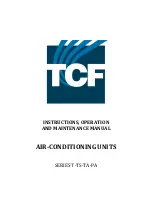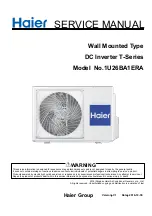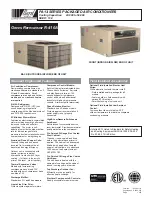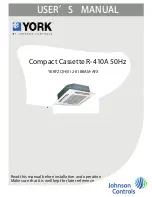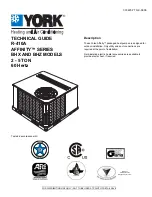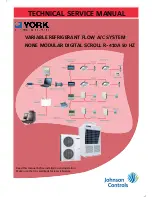
Page 13
XP25
New or Replacement Line Set
REFRIGERANT LINE SET
This section provides information on installation or
replacement of existing line set. If new or replacement line
set is not being installed, then proceed to
Brazing
Connections
IMPORTANT
Lennox highly recommends changing line set when
converting the existing system from HCFC-22 to
HFC-410A
.
If that is not possible and the line set is the
proper size as reference in table 2, use the procedure
outlined under
Flushing the System
If refrigerant lines are routed through a wall, seal and isolate
the opening so vibration is not transmitted to the building. Pay
close attention to line set isolation during installation of any
HVAC system. When properly isolated from building
structures (walls, ceilings, floors), the refrigerant lines will
not create unnecessary vibration and subsequent sounds.
See figure 8 for recommended installation practices. Also,
consider the following when placing and installing a
high-efficiency outdoor unit.
Liquid lines that meter the refrigerant, such as RFC1 liquid
lines, must not be used in this application. Existing line set of
proper size (as listed in table 3) may be reused. If system
was previously charged with HCFC-22 refrigerant, the
existing line set must be flushed (see
Flushing the System
IMPORTANT
Mineral oils are not compatible with HFC-410A
. If oil must
be added, it must be a Polyol ester oil.
Recommended topping-off POE oils are Mobil EAL ARCTIC
22 CC or ICI EMKARATE
t
RL32CF.
WARNING
Danger of fire. Bleeding the refrigerant
charge from only the high side may result
in the low side shell and suction tubing
being pressurized. Application of a brazing
torch while pressurized may result in
ignition of the refrigerant and oil mixture -
check the high and low pressures before
unbrazing.
WARNING
When using a high pressure gas such as
dry nitrogen to pressurize a refrigeration or
air conditioning system, use a regulator
that can control the pressure down to 1 or
2 psig (6.9 to 13.8 kPa).
IMPORTANT
If this unit is being matched with an approved line set or
indoor unit coil that was previously charged with mineral
oil, or if it is being matched with a coil which was
manufactured before January of 1999, the coil and line set
must be flushed prior to installation. Take care to empty all
existing traps. Polyol ester (POE) oils are used in Lennox
units charged with HFC-410A refrigerant. Residual
mineral oil can act as an insulator, preventing proper heat
transfer. It can also clog the expansion device and reduce
system performance and capacity.
Failure to properly flush the system per the XP25
Installation and Service Procedures will void the warranty.
WARNING
Refrigerant can be harmful if it is inhaled. Refrigerant
must be used and recovered responsibly.
Failure to follow this warning may result in personal injury
or death.
WARNING
Fire, Explosion and Personal Safety Haz
ard. Failure to follow this warning could re
sult in damage, personal injury or death.
Never use oxygen to pressurize or purge
refrigeration lines. Oxygen, when exposed
to a spark or open flame, can cause fire
and/or an explosion, that could result in
property damage, personal injury or death.
WARNING
When using a high pressure gas such as
nitrogen to pressurize a refrigeration or air
conditioning system, use a regulator that
can control the pressure down to 1 or 2 psig
(6.9 to 13.8 kPa).
IMPORTANT
Some scroll compressors have an internal vacuum
protector that will unload scrolls when suction pressure
goes below 20 psig. A hissing sound will be heard when
the compressor is running unloaded. Protector will reset
when low pressure in system is raised above 40 psig. DO
NOT REPLACE COMPRESSOR.
The XP25 is a variable-capacity cooling and heat pump
system utilizing variable-speed compressor technology.
With the variable-speed compressor and variable pumping
capacity, additional consideration must be given to
refrigerant piping sizing and application. The following
guidelines are to be used exclusively for the XP25 systems.





























